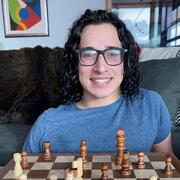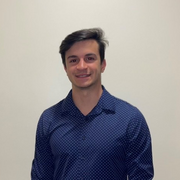
Congratulations to the following Yale Physics students, who were each awarded a 2023 NSF Graduate Research Fellowship (NSF GRFP):
- undergraduate Nikhil Harle, Physics-Intensive (Physics and Astronomy - Quantum Information Science)
- undergraduate Alejandro Simon, Physics-Intensive & Computer Science (Engineering - Optical Engineering
- graduate student Molly Watts, David Moore group (Physics and Astronomy - Particle Physics)
In addition, the following Yale Physics students and alumni were awarded honorable mentions:
- undergraduate Dawson Thomas, Mathematics & Physics
- graduate student Eleanor Graham, Reina Maruyama group;
- undergraduate alum Laura Zhou, YC’22, Physics-Intensive;
- undergraduate alum Isabel Sands, YC’21, Physics-Intensive
Brief bios of this years fellows are included below:
 Nikhil Harle is a Physics-Intensive major currently working with Michel Devoret. Nikhil served as a board member of Yale Undergraduate Quantum Computing (YuQC) for two years, during which time he served as Director of Hackathons and Director of Resources. He planned the inaugural QC Hackathon with YuQC and Stanford. He also participated in IBM and Princeton’s QURIP research program and summer school.
Nikhil Harle is a Physics-Intensive major currently working with Michel Devoret. Nikhil served as a board member of Yale Undergraduate Quantum Computing (YuQC) for two years, during which time he served as Director of Hackathons and Director of Resources. He planned the inaugural QC Hackathon with YuQC and Stanford. He also participated in IBM and Princeton’s QURIP research program and summer school.
 Alejandro Simon is double-majoring in Physics-Intensive and Computer Science working with Abhishek Bhattacharjee. While at Yale, he has done research with Professor Peter Schiffer in the Applied Physics Department, working on studying artificial spin ice. The results of this research were published in an article in Physical Review Letters. He has also worked with Professor Abhishek Bhattacharjee in the Computer Science Department, working on developing quantum algorithms for cognitive models. Finally, he spent two summers with Professor Chris Xu at Cornell University developing adaptive microscopy techniques for multiphoton microscopes. On campus, he has taught for SPLASH and been a member of the Yale Undergraduate Research Journal.
Alejandro Simon is double-majoring in Physics-Intensive and Computer Science working with Abhishek Bhattacharjee. While at Yale, he has done research with Professor Peter Schiffer in the Applied Physics Department, working on studying artificial spin ice. The results of this research were published in an article in Physical Review Letters. He has also worked with Professor Abhishek Bhattacharjee in the Computer Science Department, working on developing quantum algorithms for cognitive models. Finally, he spent two summers with Professor Chris Xu at Cornell University developing adaptive microscopy techniques for multiphoton microscopes. On campus, he has taught for SPLASH and been a member of the Yale Undergraduate Research Journal.
Alejandro’s advisor Abhishek Bhattacharjee, associate professor of computer science, said, “Alejandro is going to be a star scientist. He’s technically sharp and intellectually curious. He is also willing to find connections between different areas that seem – at first glance – disconnected. The GRFP is an excellent recognition of his potential, and I’m excited to watch his career blossom.”
 Molly Watts is a second year graduate student currently working with David Moore at Wright Lab. Molly graduated cum laude from Columbia University in 2020. After graduating, she spent a year as a SULI intern at Brookhaven National Lab (working on nEXO, a neutrinoless double beta decay experiment, and quantum computing for dark matter models). At Yale, along with Yarone Tokayer and Sebastian Fernadez-Mulligan, she started a History and Foundation of Physics club. Molly is very passionate about outreach. She has participated and led outreach initiatives in math and physics in NYC (Harlem) and New Haven. She is currently working with David Moore on nEXO and has also worked on SIMPLE on constructing an array of levitated microspheres that has application to dark matter searches.
Molly Watts is a second year graduate student currently working with David Moore at Wright Lab. Molly graduated cum laude from Columbia University in 2020. After graduating, she spent a year as a SULI intern at Brookhaven National Lab (working on nEXO, a neutrinoless double beta decay experiment, and quantum computing for dark matter models). At Yale, along with Yarone Tokayer and Sebastian Fernadez-Mulligan, she started a History and Foundation of Physics club. Molly is very passionate about outreach. She has participated and led outreach initiatives in math and physics in NYC (Harlem) and New Haven. She is currently working with David Moore on nEXO and has also worked on SIMPLE on constructing an array of levitated microspheres that has application to dark matter searches.
Molly’s advisor David Moore, assistant professor of physics, remarked, “Molly joined our group at Yale after previously working with collaborators at Brookhaven National Lab on the nEXO experiment as an undergraduate. She immediately jumped into research in our group, both on testing photodetectors for nEXO as well as helping to develop experiments to use optically trapped microparticles for dark matter searches. Beyond her research, she is working on a number of outreach efforts for communicating her research to a broad community, including leading part of our summer workshop for local high school students in the Pathways to Science program.”
The NSF GRFP recognizes and supports outstanding graduate students in NSF-supported STEM disciplines who are pursuing research-based master’s and doctoral degrees at accredited US institutions. The five-year fellowship includes three years of financial support including an annual stipend of $37,000 and a cost of education allowance of $12,000 to the institution. Click here for a list of awardees.